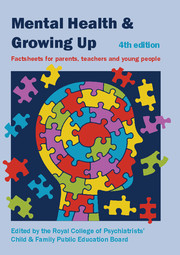Book contents
- Frontmatter
- Contents
- Contributors
- Factsheets for young people
- Factsheets for parents, carers and anyone who works with young people
- 1 Good parenting
- 2 The restless and excitable child
- 3 Dealing with tantrums
- 4 Children who soil or wet themselves
- 5 Sleep problems in childhood and adolescence
- 6 Behavioural problems and conduct disorder
- 7 Attention-deficit hyperactivity disorder (ADHD)
- 8 The child with general learning disability
- 9 Specific learning difficulties
- 10 Autism and Asperger syndrome
- 11 Depression in children
- 12 Worries and anxieties: helping children to cope
- 13 Divorce or separation of parents: the impact on children and adolescents
- 14 Death in the family: helping children to cope
- 15 The emotional cost of bullying
- 16 Traumatic stress in children
- 17 Domestic violence: its effects on children
- 18 Child abuse and neglect: the emotional effect
- 19 Drugs and alcohol: what parents need to know
- 20 Self-harm in young people
- 21 Psychosis
- 22 Schizophrenia
- 23 Bipolar disorder in children and adolescents
- 24 Obsessive–compulsive disorder in children and young people
- 25 Eating disorders in young people
- 26 Chronic physical illness: the effects on mental health
- 27 Medically unexplained physical symptoms
- 28 Chronic fatigue syndrome: helping your child get better
- 29 Parental mental illness: the problems for children
- 30 Who's who in CAMHS
4 - Children who soil or wet themselves
from Factsheets for parents, carers and anyone who works with young people
Published online by Cambridge University Press: 02 January 2018
- Frontmatter
- Contents
- Contributors
- Factsheets for young people
- Factsheets for parents, carers and anyone who works with young people
- 1 Good parenting
- 2 The restless and excitable child
- 3 Dealing with tantrums
- 4 Children who soil or wet themselves
- 5 Sleep problems in childhood and adolescence
- 6 Behavioural problems and conduct disorder
- 7 Attention-deficit hyperactivity disorder (ADHD)
- 8 The child with general learning disability
- 9 Specific learning difficulties
- 10 Autism and Asperger syndrome
- 11 Depression in children
- 12 Worries and anxieties: helping children to cope
- 13 Divorce or separation of parents: the impact on children and adolescents
- 14 Death in the family: helping children to cope
- 15 The emotional cost of bullying
- 16 Traumatic stress in children
- 17 Domestic violence: its effects on children
- 18 Child abuse and neglect: the emotional effect
- 19 Drugs and alcohol: what parents need to know
- 20 Self-harm in young people
- 21 Psychosis
- 22 Schizophrenia
- 23 Bipolar disorder in children and adolescents
- 24 Obsessive–compulsive disorder in children and young people
- 25 Eating disorders in young people
- 26 Chronic physical illness: the effects on mental health
- 27 Medically unexplained physical symptoms
- 28 Chronic fatigue syndrome: helping your child get better
- 29 Parental mental illness: the problems for children
- 30 Who's who in CAMHS
Summary
What causes bed-wetting?
There are several reasons why children may still wet the bed after the age of 5.
• Some children may just develop slower or may not yet be able to wake themselves up when their bladders are full.
• Children are more likely to wet their bed if they are very tired and sleeping deeply. Some children who are normally dry may wet their bed when this happens or when unwell.
• Bed-wetting is more likely to happen when children drink a lot before they go to bed. Their bladder may not be able to hold all the urine that is produced and empty without them waking up.
• For some children, where they have been dry for a period of time, bed-wetting can be a sign of emotional distress. They may be experiencing anxiety or stress, or it may be a reaction to major changes in their life (such as when a new baby arrives in the family or when they start school).
• Bed-wetting may also be caused by constipation, urinary tract infection (UTI) or lack of a hormone called ‘vasopressin’.
• Children are more likely to experience bed-wetting if one or both of their parents had wet the bed as children too.
What are the effects of bed-wetting?
Bed-wetting may mean that your child misses out on sleepovers, holidays or trips away. They may feel embarrassed or ashamed that they still wet the bed. This can affect their self-esteem.
Parents/carers rarely talk about their children wetting the bed. This may be because people often think that their child is the only one with a problem. It may also be because they feel guilty or responsible that they haven't been able to do something about the problem.
Is it deliberate or due to laziness?
Bed-wetting is an involuntary loss of urine at night when a child is sleeping. This means it is an accident and it is not their fault. You should never blame your child. Making your child feel bad, ashamed or anxious will only make the problem harder to deal with.
What can I do?
Below are some things that you can try out initially.
- Type
- Chapter
- Information
- Mental Health and Growing UpFactsheets for Parents, Teachers and Young People, pp. 54 - 57Publisher: Royal College of PsychiatristsPrint publication year: 2013



